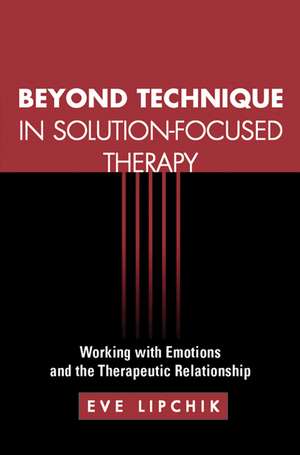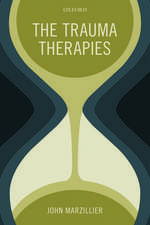Beyond Technique in Solution-Focused Therapy: Working with Emotions and the Therapeutic Relationship: The Guilford Family Therapy
Autor Eve Lipchiken Limba Engleză Paperback – 19 iul 2011
Solution-focused therapy is often misunderstood to be no more than the techniques it is famous for—pragmatic, future-oriented questions that encourage clients to reconceptualize their problems and build on their strengths. Yet when applied in a "one-size-fits-all" manner, these techniques may produce disappointing results and leave clinicians wondering where they have gone wrong. This volume adds a vital dimension to the SFT literature, providing a rich theoretical framework to facilitate nonformulaic clinical decision making. The focus is on how attention to emotional issues, traditionally not emphasized in brief, strengths-based interventions, can help "unstick" difficult situations and pave the way to successful solutions.
Din seria The Guilford Family Therapy
- 5%
 Preț: 258.84 lei
Preț: 258.84 lei -
 Preț: 273.93 lei
Preț: 273.93 lei -
 Preț: 262.10 lei
Preț: 262.10 lei - 5%
 Preț: 318.23 lei
Preț: 318.23 lei -
 Preț: 389.28 lei
Preț: 389.28 lei -
 Preț: 372.49 lei
Preț: 372.49 lei - 5%
 Preț: 333.70 lei
Preț: 333.70 lei - 19%
 Preț: 437.01 lei
Preț: 437.01 lei -
 Preț: 371.34 lei
Preț: 371.34 lei -
 Preț: 294.92 lei
Preț: 294.92 lei -
 Preț: 216.94 lei
Preț: 216.94 lei - 8%
 Preț: 469.29 lei
Preț: 469.29 lei -
 Preț: 247.45 lei
Preț: 247.45 lei -
 Preț: 250.76 lei
Preț: 250.76 lei - 5%
 Preț: 297.03 lei
Preț: 297.03 lei - 5%
 Preț: 304.00 lei
Preț: 304.00 lei - 21%
 Preț: 216.26 lei
Preț: 216.26 lei - 21%
 Preț: 214.24 lei
Preț: 214.24 lei - 25%
 Preț: 204.39 lei
Preț: 204.39 lei
Preț: 237.15 lei
Nou
Puncte Express: 356
Preț estimativ în valută:
45.39€ • 49.32$ • 38.15£
45.39€ • 49.32$ • 38.15£
Carte disponibilă
Livrare economică 31 martie-14 aprilie
Livrare express 15-21 martie pentru 23.07 lei
Preluare comenzi: 021 569.72.76
Specificații
ISBN-13: 9781609189914
ISBN-10: 1609189914
Pagini: 230
Ilustrații: black & white illustrations, figures
Dimensiuni: 152 x 229 x 18 mm
Greutate: 0.34 kg
Ediția:1
Editura: Guilford Publications
Colecția Guilford Press
Seria The Guilford Family Therapy
ISBN-10: 1609189914
Pagini: 230
Ilustrații: black & white illustrations, figures
Dimensiuni: 152 x 229 x 18 mm
Greutate: 0.34 kg
Ediția:1
Editura: Guilford Publications
Colecția Guilford Press
Seria The Guilford Family Therapy
Public țintă
Postgraduate, Professional, and Professional Practice & DevelopmentNotă biografică
Eve Lipchik, MSW, a certified member and approved supervisor of the American Association for Marriage and Family Therapy, cofounded ICF Consultants, Inc., in Milwaukee, Wisconsin, in 1988. Previously, she was a core member of the Brief Family Therapy Center in Milwaukee, where she participated in the development of solution-focused therapy. In addition to her private practice, she teaches, consults, and lectures both nationally and internationally. She is the editor of Interviewing and has been published in numerous books and journals, including Psychotherapy Networker, Journal of Systemic Therapies, and Family Process.
Cuprins
I. Theory and Practice
1. A Theory of Solution-Focused Therapy
2. The Therapist–Client Relationship
3. Understanding Clients
4. Emotions in Solution-Focused Therapy
5. The Process of Clarifying Goals
6. The Team behind the Mirror and the Consultation Break
7. The Summation Message and the Suggestion
II. Applications
8. Couple Therapy
9. Family Therapy
10. Working with Involuntary Clients
11. Long-Term Cases
12. The Solution-Focused Approach to Crisis
Recenzii
At last, someone has written a book that integrates the practical simplicity of solution-focused work with the crucial presence of emotion and relationship. Eve Lipchik liberates our understanding of feelings from cumbersome theoretical frameworks, and shows how they are a basic currency in the therapeutic exchange. This book is eminently practical and theoretically illuminating. I highly recommend it.--Stephen Gilligan, PhD, Private Practice; Author of Therapeutic Trances and The Courage to Love
Rarely does a book convey its message so well or so strongly. Eve Lipchik's mantra, 'I cannot change clients, they can only change themselves,' gently recontextualizes solution-focused work. This book shows that when therapists listen to and talk about struggle and emotion--as well as strengths and hope--clients make their own changes. Eve Lipchik writes like she works, sensitively weaving her ideas through many case examples and applications, from the emotionally overwhelmed individual to violent couples, crisis situations, and long-term situations. Treat yourself to the richness and practical wisdom of her experience and perspective.--John Walter, LCSW, and Jane Peller, LCSW, authors of Recreating Brief Therapy
In this clear yet clinically and theoretically sophisticated volume, Eve Lipchik dispels all the stereotypes of solution-focused therapy (SFT), so that even SFT skeptics will want to give the model a second look. Her version cherishes the uniqueness of clients, is nonformulaic, emotion-focused, and privileges the client-therapist relationship over technique. For Lipchik, SFT goes slowly; clients, not therapists, determine when they want to talk about solutions. Replete with rich case illustrations (which heretofore I would have assumed to be 'too complex' for SFT), the volume has left me with the imprint of a master teacher and clinician and has greatly enriched my practice. With warmth and wisdom, Lipchik shows that SFT is a living, breathing, sensitive, and evolving model.--Douglas H. Sprenkle, PhD, Marriage and Family Therapy Program, Purdue University
In this inclusive, simply written book, studded with clinical stories like raisins in a cake, Lipchik walks the reader through a deeply unusual approach to solution-focused therapy. She has broadened the theoretical base to include the idea of love as a biological given, and adds concern for emotions to the clinician's repertory. Links are made to Sullivanian theory and to practical humanism, creating a user-friendly path to guide more traditionally trained psychotherapists. This book is a gift for therapists of all stripes and a 'must-have' for training programs and libraries.--Lynn Hoffman, ACSW, Adjunct Lecturer, St. Joseph College, West Hartford; Author of Foundations of Family Therapy and Family Therapy: An Intimate History
-Rarely does a book convey its message so well or so strongly. Eve Lipchik's mantra, 'I cannot change clients, they can only change themselves,' gently recontextualizes solution-focused work. This book shows that when therapists listen to and talk about struggle and emotion--as well as strengths and hope--clients make their own changes. Eve Lipchik writes like she works, sensitively weaving her ideas through many case examples and applications, from the emotionally overwhelmed individual to violent couples, crisis situations, and long-term situations. Treat yourself to the richness and practical wisdom of her experience and perspective.--John Walter, LCSW, and Jane Peller, LCSW, authors of Recreating Brief Therapy
In this clear yet clinically and theoretically sophisticated volume, Eve Lipchik dispels all the stereotypes of solution-focused therapy (SFT), so that even SFT skeptics will want to give the model a second look. Her version cherishes the uniqueness of clients, is nonformulaic, emotion-focused, and privileges the client-therapist relationship over technique. For Lipchik, SFT goes slowly; clients, not therapists, determine when they want to talk about solutions. Replete with rich case illustrations (which heretofore I would have assumed to be 'too complex' for SFT), the volume has left me with the imprint of a master teacher and clinician and has greatly enriched my practice. With warmth and wisdom, Lipchik shows that SFT is a living, breathing, sensitive, and evolving model.--Douglas H. Sprenkle, PhD, Marriage and Family Therapy Program, Purdue University
In this inclusive, simply written book, studded with clinical stories like raisins in a cake, Lipchik walks the reader through a deeply unusual approach to solution-focused therapy. She has broadened the theoretical base to include the idea of love as a biological given, and adds concern for emotions to the clinician's repertory. Links are made to Sullivanian theory and to practical humanism, creating a user-friendly path to guide more traditionally trained psychotherapists. This book is a gift for therapists of all stripes and a 'must-have' for training programs and libraries.--Lynn Hoffman, ACSW, Adjunct Lecturer, St. Joseph College, West Hartford; Author of Foundations of Family Therapy and Family Therapy: An Intimate History
An ideal introduction to SFT and it has already had an impact on the way I work with clients....A useful and enlightening read which widened my view of SFT. I see now that SFT can be empowering for clients and a flexible framework for counsellors of many orientations.
--Private Practice, 6/17/2011Descriere
Solution-focused therapy is often misunderstood to be no more than the techniques it is famous for—pragmatic, future-oriented questions that encourage clients to reconceptualize their problems and build on their strengths. Yet when applied in a "one-size-fits-all" manner, these techniques may produce disappointing results and leave clinicians wondering where they have gone wrong. This volume adds a vital dimension to the SFT literature, providing a rich theoretical framework to facilitate nonformulaic clinical decision making. The focus is on how attention to emotional issues, traditionally not emphasized in brief, strengths-based interventions, can help "unstick" difficult situations and pave the way to successful solutions.






